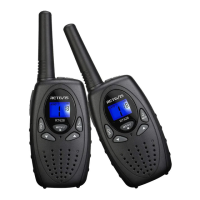• To receive calls, release the PTT button.
Transmitting 50% of the time, or less, is important because the radio
generates measurable RF energy exposure only when transmitting (in terms
of measuring standards compliance).
Exposure to Radio Frequency Energy
Your radio is designed to comply with the following national and
international standards and guidelines regarding exposure of human beings
to radio frequency electromagnetic energy:
Two-Way Radio Operation
When using your radio as a traditional two-way radio, hold the radio in
a vertical position with the microphone one to two inches (2.5 to
5 cm) away from the lips.
Facilities
To avoid electromagnetic interference and/or compatibility conflicts, turn
off your radio in any facility where posted notices instruct you to do so.
Hospitals or health care facilities may be using equipment that is sensitive
to external RF energy.
Aircraft
When instructed to do so, turn off your radio when on board an aircraft.
Any use of a radio must be in accordance with applicable regulations per
airline crew instructions.
Potentially Explosive Atmospheres
Turn off your radio prior to entering any area with a potentially explosive
atmosphere. Do not remove, install, or charge batteries in such areas. Sparks
in a potentially explosive atmosphere can cause an explosion or fire
resulting in bodily injury or even death.
Note: The areas with potentially explosive atmospheres referred to above
include fueling areas such as below decks on boats, fuel or chemical
transfer or storage facilities, areas where the air contains chemicals or
particles, such as grain, dust or metal powders, and any other area where
you would normally be advised to turn off your vehicle engine. Areas with
potentially explosive atmospheres are often but not always posted.
Blasting Caps and Areas
To avoid possible interference with blasting operations, turn off your radio
when you are near electrical blasting caps, in a blasting area, or in areas
posted: “Turn off two-way radio.” Obey all signs and instructions.
Operational Cautions
Antennas
Do not use any portable radio that has a damaged antenna.
If a damaged antenna comes into contact with your skin, a minor burn can
result.
Safety and General Information
Batteries
All batteries can cause property damage and/or bodily injury such as burns
if a conductive material such as jewelry, keys, or beaded chains touch
exposed terminals.
The conductive material may complete an electrical circuit (short circuit)
and become quite hot. Exercise care in handling any charged battery,
particularly when placing it inside a pocket, purse, or other container with
Page 8 Page 9

